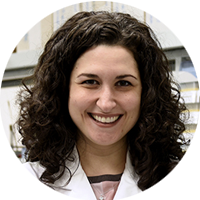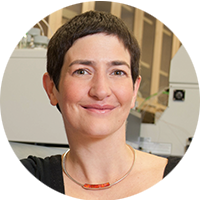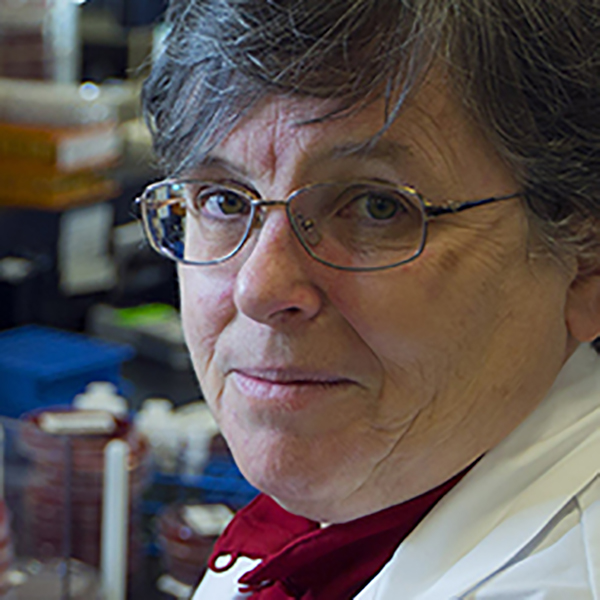Long COVID




Fine analysis of longitudinal immune responses to SARS-CoV-2 in vaccination: Harnessing the power of ‘Stop The Spread Ottawa’ to understand immune protection in COVID-19
Angela M. Crawley and Marc-André Langlois, Ottawa Hospital Research Institute
This research team is studying the T cell response in participants over the course of a year. We are evaluating how participants’ T cells respond to COVID-19, as well as antibodies, using a systematic approach to define correlates of protection (COP).
Research summary Results Study website View study on 

Identification of microbial factors to modulate immune dysregulation and treat post-COVID-19 syndrome
Emilia Liana Falcone, Institut de recherches cliniques de Montréal
This research centers around a hypothesis that long COVID symptoms are at least in part due to microbes in the intestines caused by COVID-19 which create bacteria that leaks from the stomach and intestinal lining and moves elsewhere in the body including into the blood, resulting in persistent inflammation.
Research summary Results Study website View study on 




Autoimmunity as a novel mechanism in post-COVID syndrome
Andrew Baker and Claudia dos Santos, Unity Health Toronto
This group of researchers is looking at post-COVID syndrome and its relationship to post-ICU (intensive care unit) syndrome. They are following 200 participants with post-COVID syndrome. Their main hypothesis is that autoimmunity—when a person’s immune system produces autoantibodies that cause damage to the body—plays a role in post-COVID syndrome.
Research summary Results Study website View study on 

SARS-CoV-2 triggers Autoimmunity: implications for the pathogenesis of Post-Acute COVID-19 Syndrome (AI-PACS)
Manali Mukherjee, McMaster University
This team of expert clinicians and scientists is following 120 people experiencing long COVID in Ontario and British Columbia. They aim to understand the exact impairment long COVID engenders in the immune system, why patients with it develop autoantibodies, and characterize the impact long COVID has on clinical symptoms.
Research summary Results Study website View study on 
Variants of Concern
Manali Mukherjee
Manali Mukherjee, PhD
Assistant Professor, Medicine, McMaster University
Affiliate Scientist, Firestone Institute for Respiratory Health, Research Institute of St Joe’s
Contact info
mukherj@mcmaster.ca
Key words
Autoantibodies
Airway inflammation
Biomarkers
Autoimmune diseases
Asthma
PACS
Research interests
Autoimmunity in complex airways disease
Development of biomarkers for optimal management of complex airways disease
Long-COVID and autoimmunity
Publications
Bhalla A, Mukherjee M, Radford K, Nazy I, Kjarsgaard M,. Bowdish D, Nair P. Dupilumab, Severe Asthma Airway Responses, and SARS-CoV2 Serology. Allergy.2020 Aug 6:10.1111/all.14534. doi: 10.1111/all.14534
Kennedy AE, Cook L, Cowbrough B, Wallace JG, Huynh A, Smith JW, Son K, Stacey H, Ang J, McGeer A, Coleman BL, Surette MG, Larché M, Larché M, Hambly N, Nair P, Ask , Atkinson S, Miller MS, Bramson J, Levings MK, Nazy I, Svenningsen S, Mukherjee M, Bowdish DME. Lasting changes to circulating leukocytes in people with mild SARS-CoV-2 infections. 27 Sep 2021 medRxiv DOI: 10.1101/2021.09.25.21264117 (under review, Viruses)
Jamil R, Tselios K, Mukherjee M. Evidence of autoimmunity triggered by SARS-CoV-2 in acute and Post-acute COVID-19: a systematic literature review. Authorea. October 08, 2021.
DOI: 10.22541/au.163370863.38162314/v1 (under review, Allergy)
SARS-CoV-2 triggers Autoimmunity: implications for the pathogenesis of Post-Acute COVID-19 Syndrome (AI-PACS)
The immune system is programmed to protect people against foreign invaders such as viruses, but the immune system can also produce autoantibodies that cause damage to the body. This is called autoimmunity, and it can lead to the development of chronic and serious diseases including lupus, rheumatoid arthritis, vasculitis, and scleroderma.
By September 2021, more than 1,500,000 cases of COVID-19 had been documented in Canada, including 27,000 deaths from the disease. Apart from complications which develop in the acute phase of COVID-19, around 15 per cent of patients who recover continue to experience symptoms such as chronic fatigue, shortness of breath, joint pain, and cognitive impairment or “brain fog”. This syndrome has been labeled “long COVID” or Post-acute COVID-19 Syndrome (PACS). It can happen to people of any age even if their COVID-19 symptoms were mild. The cause of this has not been determined, but data supports the idea that the virus’s inappropriate activation of the immune system may play a role.
Our preliminary data show that more than half of COVID-19 patients develop multiple autoantibodies after recovering from the disease, however it is not known whether they will develop autoimmune diseases in the future. Our team of expert clinicians and scientists is following 120 people experiencing PACS in Ontario and British Columbia. Our aims are to understand the exact impairment of the immune system and why these patients develop autoantibodies, and to characterize the impact on the clinical symptoms of PACS and potentially identify ways to modify this.
The study’s impact will be significant since an estimated 100,000 Canadians will experience PACS.
SARS-CoV-2 triggers Autoimmunity: implications for the pathogenesis of Post-Acute COVID-19 Syndrome (AI-PACS)
Claudia dos Santos
Claudia dos Santos, MD
Associate Professor of Medicine, University of Toronto
Genomic Lead for the Precision Medicine for Critical Care Center, Unity Health Toronto
Contact info
Claudia.dossantos@unityhealth.to
Key words
Sepsis
ARDS
Inflammation
Injury
Infection
Host response
Transcriptomics
microRNAomics,
DNA methylation
Gene expression
Innate immune response
Research interests
Host response
Molecular stratification
Discovery patient endotypes
Discovery novel targets
Mechanisms of response to injury, infection and inflammation
Publications
Trahtemberg U, Rottapel R, Dos Santos CC, Slutsky AS, Baker A, Fritzler MJ. Anticardiolipin and other antiphospholipid antibodies in critically ill COVID-19 positive and negative patients. Ann Rheum Dis. 2021 Sep;80(9):1236-1240. doi: 10.1136/annrheumdis-2021-220206. Epub 2021 Apr 26. PMID: 33903092; PMCID: PMC8076626.
Gill SE, Dos Santos CC, O’Gorman DB, Carter DE, Patterson EK, Slessarev M, Martin C, Daley M, Miller MR, Cepinskas G, Fraser DD; Lawson COVID19 Study Team. Transcriptional profiling of leukocytes in critically ill COVID19 patients: implications for interferon response and coagulation. Intensive Care Med Exp. 2020 Dec 11;8(1):75. doi: 10.1186/s40635-020-00361-9. PMID: 33306162; PMCID: PMC7729690.
Andrew Baker
Andrew Baker, MD
Professor, Anesthesia, Critical Care Medicine and Surgery
Vice Chair, Clinical Affairs, Department of Anesthesia, University of Toronto
Chief, Department of Critical Care, Chief, Department of Anesthesia, Cara Phelan Endowed Chair in Critical Care Medicine, Medical Director, Surgery and Critical Care Program, St. Michael’s Hospital, Unity Health Toronto
Contact info
Andrew.Baker@unityhealth.to
Key words
Critical care
Mechanical ventilation
Sepsis
ARDS
Anesthesia
Brain injury
Concussion
Traumatic brain injury
Organ donation
Research interests
Host response to injury
Brain injury
Organ donation
Publications
Trahtemberg U, Rottapel R, Dos Santos CC, Slutsky AS, Baker A, Fritzler MJ. Anticardiolipin and other antiphospholipid antibodies in critically ill COVID-19 positive and negative patients. Ann Rheum Dis. 2021 Sep;80(9):1236-1240. doi: 10.1136/annrheumdis-2021-220206. Epub 2021 Apr 26. PMID: 33903092; PMCID: PMC8076626.
Autoimmunity as a novel mechanism in post-COVID syndrome
Some people recovering from COVID-19 continue to experience bad health outcomes. Even when not requiring hospitalization, many of these people suffer for a long time from a low health-related quality of life with symptoms such as cognitive dysfunction (also called “brain fog”), loss of taste and smell, and weakness, among other symptoms.
This condition is known as long COVID or post-COVID syndrome. The reasons for this are unknown, yet it is likely related to a syndrome called post-ICU (intensive care unit) syndrome that affects people who have had other severe diseases.
In our study, we are looking at post-COVID syndrome and its relationship to post-ICU syndrome. We are following 200 participants at four time points with post-COVID syndrome . Our main hypothesis is that autoimmunity—when a person’s immune system produces autoantibodies that cause damage to the body—plays a role in post-COVID syndrome. We aim to:
- Map the autoimmune landscape of acute COVID-19 by assessing a broad variety of autoantibodies among severe COVID-19 patients over time, and its association with specific organ dysfunction;
- Study the development of these autoantibodies using immune mediators and measurements of immune cells;
- Validate our findings in long-term post-COVID patients to determine if they have the same autoantibodies and the same organ dysfunction as seen in post-ICU syndrome.
Our findings will allow us to understand the role of autoantibodies in post-COVID syndrome. This knowledge could facilitate the use of existing immune-modulating medications (medications that enhance the body’s response) to treat patients with post-COVID syndrome and possibly prevent it from happening.
Extracellular vesicles promote the recovery of heart function
Angela M. Crawley
Angela M. Crawley
Scientist, The Ottawa Hospital Research Institute (OHRI)
Assistant Professor, University of Ottawa
Adjunct Professor, Carleton University
PhD Scientist, Department of Medicine, The Ottawa Hospital
Biobank Director, Coronavirus Variant Rapid Response Network (CoVaRR Net)
Contact info
acrawley@ohri.ca
Key words
Immune response
Vaccine
Coronavirus
T-cells
Antibodies
Pre-existing immunity
PACS
Long-haulers
Research interests
T-cells
Antibodies
Impaired immunity
Immunogenicity
Correlates of protection
Publications
Abdallah SJ., Voduc N., Corrales-Medina V., McGuinty M., Pratt A., Chopra A., Law A., Garuba HA., Thavorn K., Reid RER., Lavoie KL., Crawley AM., Chirinos JA., Cowan J. Symptoms, pulmonary function and functional capacity four months after COVID-19. Annals of ATS (accepted April 2021).
Yannick G*., Siragam V, G*., Laroche G, Marion E, Greig M, McGuinty M, Booth R, Durocher Y, Cuperlovic-Culf M, Bennett S, Crawley AM, Giguère P, Cooper C, & MA, Langlois. Relative Ratios of Human Seasonal 1 Coronavirus Antibodies Predict the Efficiency of Cross-Neutralization of SARS-CoV-2 Spike Binding to ACE2. Manuscript submitted to Journal of Clinical Investigations (July 2021). *co-authors
Marc-André Langlois, PhD
Marc-André Langlois, PhD
Canada Research Chair in Molecular Virology and Intrinsic Immunity
Professor, Faculty of Medicine
Department of Biochemistry, Microbiology and Immunology
University of Ottawa
Key words
SARS-CoV-2
Humoral immunity
Vaccine-induced immunity
Research interests
Molecular virology
Innate immunity
SARS-CoV-2
Influenza
HIV
Retroviruses Publications https://www.covid19immunitytaskforce.ca/dried-blood-spot-assays-a-review/
Fine analysis of longitudinal immune responses to SARS-CoV-2 in vaccination: Harnessing the power of ‘Stop The Spread Ottawa’ to understand immune protection in COVID-19
The rollout of COVID-19 vaccine campaigns in Canada meant that millions of people received vaccinations against the SARS-CoV-2 virus in a relatively short time. Simultaneously, researchers have been actively addressing important questions about COVID-19 and the vaccines to support public health decision-makers. These questions include how long does immunity last, what is a protective response to natural SARS-CoV-2 infection, and can natural or vaccine immunity protect against viral variants of concern? Evidence indicates that protection against SARS-CoV-2 requires a good quality antibody response as well as a coordinated T cell (a type of immune cell) response for long-lasting immunity.
This study, called Fine analysis of longitudinal immune responses to SARS-CoV-2 in vaccination: Harnessing the power of ‘Stop The Spread Ottawa’ to understand immune protection in COVID-19, which builds on another CITF-funded study called Stop the Spread Ottawa (SSO), is addressing these and other issues by studying the T cell response in participants over the course of a year. SSO has enrolled more than 1,100 people, who have either tested positive for SARS-CoV-2 or have a higher risk of exposure to the virus. Participants include front-line workers and patient subgroups of interest, and they are followed through a primary infection or re-infection, as well as vaccination. The research team is evaluating how participants’ T cells respond to COVID-19, as well as antibodies, using a systematic approach to define correlates of protection (COP). Evaluating COP in the young and elderly over time will add understanding to the strengths and limitations of host immunity to SARS-CoV-2 and inform future vaccinations, if needed. The SSO study also includes several COVID-19 “long haulers”, an emerging group of clinical concern.
This research will provide important information about the immune response to COVID-19 and to vaccines, and contribute to a better understanding of protective immunity levels to support public health decision-makers in managing ongoing vaccine deployment and pandemic control measures.
Results: Fine analysis of longitudinal immune responses to SARS-CoV-2 in vaccination: Harnessing the power of ‘Stop The Spread Ottawa’ to understand immune protection in COVID-19
Emilia Liana Falcone
Emilia Liana Falcone
Assistant Clinical Professor, Université de Montréal
Assistant Research Professor, Institut de recherches cliniques de Montréal (IRCM)
Infectious Diseases Specialist, Centre Hospitalier de l’Université de Montréal (CHUM)
Director, IRCM Post-COVID-19 (IPCO) Research Clinic
Director, Microbiome and Mucosal Defence Research Unit, IRCM
Contact info
Emilia.falcone@ircm.qc.ca
Key words
Post-COVID-19 condition
Long COVID-19
Microbiome
Intestinal barrier
Immunity
Inflammation
Inborn errors of immunity
Research interests
Identification of pathophysiological mechanisms underlying the post-COVID-19 condition.
Identification of novel therapeutic targets to treat the post-COVID-19 condition.
Understanding how inborn errors of immunity impact the composition and function of the intestinal microbiota.
Understanding how the intestinal microbiota drives local and systemic inflammation and immune responses.
Publications
The Biobanque québécoise de la COVID-19 (BQC19)-A cohort to prospectively study the clinical and biological determinants of COVID-19 clinical trajectories. Tremblay K, Rousseau S, Zawati MH, Auld D, Chassé M, Coderre D, Falcone EL, Gauthier N, Grandvaux N, Gros-Louis F, Jabet C, Joly Y, Kaufmann DE, Laprise C, Larochelle C, Maltais F, Mes-Masson AM, Montpetit A, Piché A, Richards JB, Tse SM, Turgeon AF, Turecki G, Vinh DC, Wang HT, Mooser V; BQC19. PLoS One. 2021 May 19;16(5):e0245031.
Identification of microbial factors to modulate immune dysregulation and treat post-COVID-19 syndrome
Post-COVID-19 syndrome (also known as long COVID) represents a new epidemic within the pandemic, potentially affecting more than 330,000 Canadians, as of March 2022. While several studies have described post-COVID-19 symptoms, no studies to date have demonstrated what causes these symptoms. Previous studies have demonstrated that the composition of the intestinal microbiota—or community of microorganisms—in patients with acute COVID-19 corresponds with disease severity and markers of inflammation and tissue damage. Studies in other viral infections such as HIV have demonstrated that a disturbance in the intestinal microbiota and movement of intestinal bacteria into blood circulation contribute to inflammation and end-organ damage.
This research team has established the first post-COVID-19 research clinic in Montreal and, working with the existing infrastructure, they are addressing our hypothesis that perturbations of the intestinal microbiota caused by COVID-19 infection persist for months following infection, leading to bacteria leaking from the stomach and intestinal lining (leaky gut) and moving elsewhere in the body including into the blood, resulting in persistent inflammation and post-COVID-19 manifestations. In this study called Identification of microbial factors to modulate immune dysregulation and treat post-COVID-19 syndrome, researchers are studying patients with post-COVID-19 syndrome, patients with resolved COVID-19 and patients who tested negative for COVID-19. The research goals are three-fold: define the composition and function of the intestinal microbiota; determine if patients with post-COVID-19 syndrome have a leaky gut by evaluating the movement of bacteria into their system; and determine if patients with post-COVID-19 syndrome have increased systemic inflammation and immune dysregulation.
This important study will help uncover a mechanism for post-COVID-19 syndrome, identify diagnostic markers and propose new therapies such as probiotics or microbially derived metabolites to treat this debilitating syndrome.
Vaccination helps reduce long COVID-19 symptoms and down-regulate systemic markers of inflammation
Results: SeroTracker
Variants of Concern




Variants of concern: escape from infection- and vaccination-induced immunity in older adults
Anne-Claude Gingras and Allison McGeer, Sinai Health System
This team is studying to what extent the different variants circulating in Canada are efficiently neutralized in older adults’ immune systems after vaccination. It’s important to study older adults as this population group is likely to build lower levels of antibodies following vaccination and is more susceptible to severe disease.
Research summary Results Study website View study on 

Intranasal multivalent vaccines targeting COVID-19 variants of concern
Jun Liu, University of Toronto
This study aims to develop multivalent vaccines, that is, vaccines which are capable of combatting more than one variant at the same time. The team is also determining the benefits of administering these vaccines by the nose, rather than with a needle.
Research summary Results Study website View study on 




Mapping the Emergence and Functional Impact of Novel SARS-CoV-2 Variants
Jeff Wrana and Laurence Pelletier, Sinai Health System
This study is using data from thousands of positive COVID-19 samples to identify known and new variants. It seeks to define the impact of the mutations on the virus’ ability to infect cells and be neutralized. The team will also use next-generation sequencing to identify why VOCs are more infectious and deadly and use mathematical modelling to monitor and predict the spread and prevalence of VOCs.
Research summary Results Study website View study on 




Evaluating the durability and the cross-reactivity of SARS-CoV-2 immunity elicited by COVID-19 vaccines
Mark Brockman and Felix Breden, Simon Fraser University
This project is comparing the immune response in younger and older adults after administration of COVID-19 vaccines. The team is following people to characterize the range of antibody-producing B cells each person generates, and to link genetic features of these cells to each individual’s ability to neutralize viral variants of concern.
Research summary Results Study website View study on 

Viral diversity and immune escape: variants in vulnerable individuals post-vaccination
Ciriaco Piccirillo, McGill University Health Centre
This study is actively investigating new SARS-CoV-2 infections in about 100 vaccinated people in general and priority populations. It is assessing the impact of variants on human health through viral genomics, computational biology, and immune testing.
Research summary Results Study website View study on 
Dr. Ciriaco Piccirillo
Dr. Ciriaco Piccirillo
Professor of Microbiology and Immunology, McGill University
Senior Scientist, Research Institute of the McGill University Health Centre
Departments of Microbiology & Immunology and Medicine, McGill University
Research Institute of the McGill University Health Centre
Director, Centre of Excellence in Translational Immunology (CETI)
Director, Immune Phenotyping Platform
Contact info
Ciro.piccirillo@mcgill.ca
Key words
Immune responses, vaccines, T and B lymphocytes, antibodies, Immunoregulatory mechanisms, correlates of protection, correlates of risk, epitope mapping, immune escape of viral variants
Research interests
Immune responses
Vaccines
T and B lymphocytes
Antibodies
Immunoregulatory mechanisms
Publications
Selection for immune evasion in SARS-CoV-2 revealed by high-resolution epitope mapping combined with genome sequence analysis. Arnaud N’Guessan, Senthil Kumar Duraikannu Kailasam, Raphael Poujol, Fatima Mostefai, Jean-Christophe Grenier, Raffaele De Palma, Carsten Haber, Volker Stadler, Guillaume Bourque, Julie Hussin, Jesse Shapiro, Jörg H. Fritz, Ciriaco Piccirillo
Viral diversity and immune escape: variants in vulnerable individuals post-vaccination
As viral variants of SARS-CoV-2 continue to emerge, several critical questions must be answered to support public health decision-making, reduce the impact of the variants on different population groups, and help prevent subsequent waves of the pandemic. These questions include whether all variants are a public health concern, which variants are capable of evading vaccine-induced protection thus causing vaccinated individuals to become infected, and whether an individual’s age or immune status influences the evolution and transmission of variants.
Our multidisciplinary team of researchers is actively investigating new SARS-CoV-2 infections in the general population, as well as among specific groups of elderly people and cancer patients, all of whom have been previously vaccinated against COVID-19. We are following about 100 participants (patients with malignancies and long–term care residents) at two points post vaccinations.
We are looking for the emergence of new SARS-CoV-2 variants in these individuals and assessing these variants’ impact on human health through viral genomics (studying viruses at the genetic level), computational biology (using computers to study complex biological systems), and immune testing. Our study rests on three major pillars, which are:
- Undertaking clinical surveillance of SARS-CoV-2 variants in humans and using novel sequencing technologies to rapidly detect variants.
- Sequencing viral genomes and tracking SARS-CoV-2 mutations in elderly and immunocompromised individuals.
- Conducting immunological and functional evaluation of SARS-CoV-2 variants.
We are also modelling the future transmission of SARS-CoV-2 to identify optimal population-wide control scenarios if and when the effectiveness of available vaccines is reduced.
Omicron and other variants of concern: finding our way forward
Mark Brockman
Mark Brockman, PhD
Professor, Simon Fraser University
Contact info
Mark_Brockman@sfu.ca
Key words
Vaccines
Variants of Concern
Adaptive immune response
Immune receptor repertoire
Partial immunity
Elderly adults
HIV
Research interests
Understanding the impact of older age on vaccine-induced immune responses to SARS-CoV-2 and variants
Examining the role of B cell receptor diversity in cross-recognition/cross-neutralization of viral variants
Evaluating T cell receptor diversity in the context of viral sequence adaptation and immune evasion
Publications
Brockman et al. Weak humoral immune reactivity among residents of long-term care facilities following one dose of the BNT162b2 mRNA COVID-19 vaccine. medRxiv 2021 March 24 (https://doi.org/10.1101/2021.03.17.21253773)
Brockman et al. Reduced magnitude and durability of humoral immune responses by COVID-19 mRNA vaccines among older adults. medRxiv (https://doi.org/10.1101/2021.09.06.21263149)
Evaluating the durability and the cross-reactivity of SARS-CoV-2 immunity elicited by COVID-19 vaccines
COVID-19, which is caused by severe acute respiratory syndrome coronavirus 2 (SARS-CoV-2), rapidly advanced from initial clinical observations in late 2019 to a global pandemic. Safe and effective vaccines offer the best opportunity to control the spread of infection, but the availability of vaccine doses in some countries and the rapid emergence of new viral strains—which may evade immunity generated by the current vaccines—are issues of concern. We know that vaccination can result in partial immunity in certain individuals, such as older adults, which may diminish protection from infection caused by the new viral strains, but we still have an incomplete understanding of the immune factors that can identify individuals or populations that remain at higher risk despite receiving the vaccine.
To study this further, our project is comparing the immune response in younger and older adults at four time points after administration of COVID-19 vaccines. We are following 151 people to characterize the range of antibody-producing B cells each person generates, and to link genetic features of these cells to each individual’s ability to neutralize viral variants of concern.
Our results will provide new information about vaccine-elicited immune responses and inform ongoing efforts to protect the most vulnerable members of our society.
Omicron and other variants of concern: finding our way forward
Felix Breden
Felix Breden, PhD
Professor Emeritus, Simon Fraser University
Contact info
breden@sfu.ca
Key words
Antibody/B-cell receptor repertoires
T-cell receptor repertoires
AIRR-seq data
Distributed repositories
COVID-19 patients
COVID-19 vaccination response
Databases
Adaptive immune system
iReceptor
Research interests
Resources for studying the human adaptive immune system
Federating antibody/B-cell and T-cell receptor repertoires
Standards for sharing immune data
Publications
Scott J. K. and F. Breden. 2020. The AIRR Community as a model for FAIR stewardship of big immunology data. Current Opinion in Systems Biology. 24:71-77. https://doi.org/10.1016/j.coisb.2020.10.001.
Anne-Claude Gingras
Anne-Claude Gingras
Professor, Dept. of Molecular Genetics, University of Toronto
Senior Investigator, Lunenfeld-Tanenbaum Research Institute, Sinai Health
Contact info
gingras@lunenfeld.ca
Key words
Antibody profiling, assay automation, lentivirus, Variants of Concern, protein interactions
Research interests
Systematically employing proteomics approaches, alongside molecular biology, cell biology and genetics techniques to provide a better understanding of the key signalling pathways that control cell and tissue growth in normal and disease states.
Development of quantitative proteomics technologies.
Using tools Dr. Gingras has developed, her research group has identified new protein complexes and signaling components that provide a better understanding of perturbations associated with cancer and rare diseases.
Publications
Abe, K.T.*, Li, Z.*, Samson, R,, Samavarchi-Tehrani P., Valcourt, E.J., Wood, H., Budylowski, P., Dupuis, A.P. 2nd, Girardin, R.C, Rathod, B., Wang, J.H., Barrios-Rodiles, M., Colwill, K., McGeer, A.J., Mubareka, S., Gommerman, J.L., Durocher, Y., Ostrowski, M., McDonough, K.A, Drebot, M.A, Drews, S.J., Rini, J.M.**, Gingras, A.-C.** (2020) A simple protein-based surrogate neutralization assay for SARS-CoV-2. Journal of Clinical Investigation Insight, 5:142362. PMID: 32870820
Kim. D.K., Knapp, J.J., Kuang, D., Chawla, A., Cassonnet, P., Lee, H., Sheykhkarimli, D., Samavarchi-Tehrani, P., Abdouni, H., Rayhan, A., Li, R., Pogoutse, O., Coyaud, É., van der Werf, S., Demeret, C., Gingras, A.-C., Taipale, M., Raught, B., Jacob, Y., Roth. F.P. (2020) A Comprehensive, Flexible Collection of SARS-CoV-2 Coding Regions. G3 (Bethesda), 10: 3399-3402. PMID: 32763951
Isho, B.*, Abe, K.T.*, Zuo, M.*, Jamal, A.*, Rathod, B., Wang, J.h., Li, Z., Chao, G., Rojas, O.L., Bang, Y.M., Pu, A., Christie-Holmes, N., Gervais, C., Ceccarelli, D., Samavarchi-Tehrani, P., Guvenc, F., Budylowski, P., Li, A., Paterson, A., Yun, F.Y., Marin, L.M., Cladwell, L., Wrana, J.L., Colwill, K., Sicheri, F., Mubareka, S., Gray-Owen, S.D., Drews, S.J., Siqueira, W.L., Barrios-Rodiles, M., Ostrowski, M., Rini, J.M., Durocher, Y., McGeer, A.J., Gommerman, J.L.**, Gingras, A.-C.** (2020). Persistence of serum and saliva antibody responses to SARS-CoV-2 spike antigens in COVID-19 patients. Science Immunol., 5: eabe5511. PMID: 33033173
Law, J., Koh, W., Budylowski, P., Lin, J., Yue, F., Abe, K., Rathod, B., Girard, M., Li, Z., Rini, J., Mubareka, S., McGeer, A., Chan, A., Gingras, A.-C., Watts, T., Ostrowski, M. (2020). Systematic examination of T cell responses to SARS-CoV-2 versus influenza virus reveals distinct inflammatory profile. J Immunol, 206: 37-50. PMID: 33208459
Azad, T., Singaravelu, R., Taha, Z., Jamieson, T.R., Boulton, S., Crupi, M.J.F., Martin, N.T., Brown, E.E.F., Poutou, J., Ghahremani, M., Pelin, A., Nouri, K., Rezaei, R., Marshall, C.B., Enomoto, M., Arulanandam, R., Alluqmani, N., Samson, R., Gingras, A.-C., Cameron, D.W., Greer, P.A., Ilkow, C.S., Diallo, J.S., Bell, J.C. (2021) Nanoluciferase complementation-based bioreporter reveals the importance of N-linked glycosylation of SARS-CoV-2 S for viral entry. Mol Ther, 29: 1984-2000. PMID: 33578036
Lee, B.E., Sikora, C., Faulder, D., Risling, E., Little, L.A., Qiu, Y., Gao, T., Bulat, R., Craik, S., Hrudey, S.E., Ohinmaa, A., Estabrooks, C.A., Gingras, A.-C., Charlton, C., Kim, J., Wood, H., Robinson, A., Kanji, J.N., Zelyas, N., O’Brien, S.F., Drews, S., Pang, X.L. (2021) Early warning and rapid public health response to prevent COVID-19 outbreaks in long-term care facilities (LTCF) by monitoring SARS-CoV-2 RNA in LTCF site-specific sewage samples and assessment of antibodies response in this population: prospective study protocol. BMJ Open, 11: e052282. PMID: 34417219
Yau, K., Abe, K.T., Naimark, D., Oliver, M.J., Perl, J., Leis, J.A., Bolotin, S., Tran, V., Mullin, S.I., Shadowitz, E., Gonzalez, A., Sukovic, T., Garnham-Takaoka, J., de Launay, K.Q., Takaoka, A., Straus, S.E., McGeer, A.J., Chan, C.T., Colwill, K., Gingras, A.-C.**, Hladunewich, M.A. (2021) Evaluation of the SARS-CoV-2 Antibody Response to the BNT162b2 Vaccine in Patients Undergoing Hemodialysis. JAMA Netw Open, 4: e2123622. PMID: 34473256
Saeed S, O’Brien SF, Abe K, Yi QL, Rathod B, Wang J, Fazel-Zarandi M, Tuite A, Fisman D, Wood H, Colwill K, Gingras AC, Drews SJ. (2021) Severe acute respiratory syndrome coronavirus 2 (SARS-CoV-2) seroprevalence: Navigating the absence of a gold standard. PLoS One 23;16(9):e0257743. PMID: 34555095
Preprints (selected):
Samavarchi-Tehrani, P., Abdouni, H., Knight, J.D.R., Astori, A., Samson, R., Lin, Z.-Y., Kim, D.K., Knapp, J.J., St-Germain, J., Go, C.D., Larsen, B., Wong, C.J., Cassonnet, P., Demeret, C., Jacob, Y., Roth, F.P., Raught, B.*, Gingras, A.-C.* (2020) A SARS-CoV-2 – host proximity interactome. bioRxiv 2020.09.03.282103; doi: https://doi.org/10.1101/2020.09.03.282103
St-Germain, J.R., Astori, A., Samavarchi-Tehrani, P., Abdouni, H., Macwan, V., Kim, D.K., Knapp, J.J., Roth, F.P., Gingras, A.-C.**, Raught, B.** (2020) A SARS-CoV-2 BioID-based virus-host membrane protein interactome and virus peptide compendium: new proteomics resources for COVID-19 research. bioRxiv 2020.08.28.269175; doi: https://doi.org/10.1101/2020.08.28.269175
Abe, K.T., Hu, Q., Mozafarihashjin, M., Samson, R., Rathod, B., Chao, G., Wang, J.H., Iskilova, M., Pasculescu, A., Fazel-Zarandi, M., Li, A., Paterson, A., Green, K., Gilbert, L., Barati, S., Haq, N., Takaoka, A., Takaoka, J.G., De Launay, K.Q., Fahim, C., Sheikh-Mohamed, S., Arita, U., Durocher, Y., Marcusson, E.G., Gommerman, J.L., Ostrowski, M., Colwill, K., Straus, S.E., Wood, H., McGeer, A.J.**, Gingras, A.-C.** (2021) Neutralizing antibody response to SARS-CoV-2 variants in vaccinated Long-Term Care Home (LTCH) residents and workers.
Allison McGeer, MD
Allison McGeer, MD
Professor, University of Toronto
Infectious Disease Consultant, Sinai Health System
Key words
Adult immunization
Epidemiology
long term care
Research interests
My research interests are in the prevention of healthcare associated infection, the use of epidemiology to decrease the burden of infectious diseases, and adult immunization.
Publications
Abe KT, Li Z, Samson R, Samavarchi-Tehrani P, Valcourt EJ, Wood H, et al. A simple protein-based surrogate neutralization assay for SARS-CoV-2. JCI insight. 2020;5(19).
Isho B, Abe KT, Zuo M, Jamal AJ, Rathod B, Wang JH, et al. Persistence of serum and saliva antibody responses to SARS-CoV-2 spike antigens in COVID-19 patients. Science immunology. 2020;5(52).
Kohler PP, Kahlert CR, Sumer J, Flury D, Güsewell S, Leal-Neto OB, et al. Prevalence of SARS-CoV-2 antibodies among Swiss hospital workers: Results of a prospective cohort study. Infection control and hospital epidemiology. 2020:1-5.
Law JC, Koh WH, Budylowski P, Lin J, Yue F, Abe KT, et al. Systematic Examination of Antigen-Specific Recall T Cell Responses to SARS-CoV-2 versus Influenza Virus Reveals a Distinct Inflammatory Profile. Journal of immunology (Baltimore, Md : 1950). 2021;206(1):37-50.
Variants of concern: escape from infection- and vaccination-induced immunity in older adults
Since the beginning of the COVID-19 pandemic, scientists have learned much about the biology of the SARS-CoV-2 virus which causes COVID-19. The virus’s spike protein can bind to a protein called ACE2 at the surface of human cells. In response to viral infection, the body tries to defend itself by producing antibodies, including a class of antibodies called neutralizing antibodies that attach to the virus spike protein and prevent it from binding to the ACE2 protein. The COVID-19 vaccines approved in Canada work by mimicking the viral spike protein, which, once administered, cause the body to produce neutralizing antibodies.
While the COVID-19 vaccines have been extremely successful in driving immunity to the original circulating strain, viruses like SARS-CoV-2 make mistakes, or mutations, when they replicate their genetic material. Often, the mutations don’t change the virus properties, and they can even negatively affect the virus. But sometimes, the mutations provide the virus some selective advantages. For example, some of the SARS-CoV-2 mutations, like Alpha, the B.1.1.7 strain first identified in the UK, have caused the spike protein to bind more tightly to ACE2, while some other mutations make the virus less efficiently neutralized by antibodies. These potentially more dangerous strains are called “Variants of Concern”, or VOCs, and it’s expected that new variants will continue to emerge.
Our study, called Variants of concern: escape from infection- and vaccination-induced immunity in older adults, is following 400 participants for one year. We are studying to what extent the different variants circulating in Canada are efficiently neutralized in older adults’ immune systems, since this population group is likely to build lower levels of antibodies following vaccination and is more susceptible to severe disease. Our results will contribute to ongoing efforts to understand vaccine-induced immunity in priority populations in Canada.
RESULTS: Variants of concern: escape from infection- and vaccination-induced immunity in older adults
Jun Liu
Jun Liu, PhD
Professor, Department of Molecular Genetics, Temerty Faculty of Medicine, University of Toronto
Contact info
jun.liu@utoronto.ca
Key words
Vaccine
Tuberculosis
Mycobacterium tuberculosis
SARS-CoV-2
COVID-19
Research interests
COVID-19 vaccines
Tuberculosis vaccines
Small non-coding RNA in bacteria
Publications
Cao HB, Mai JT, Zhou ZC, Li ZJ, Duan RQ, Watt J, Chen ZY, Bandara RA, Li M, Ahn SK, Poon B, Christie N, Gray-Owen S, Kozak R, Mubareka S, Rini JM*, Hu J*, and Liu J*. (2021). Intranasal HD-Ad Vaccine Protects the Upper and Lower Respiratory Tracts of hACE2 Mice against SARS-CoV-2. bioRxiv.
Intranasal multivalent vaccines targeting COVID-19 variants of concern
The COVID-19 pandemic, caused by the SARS-CoV-2 virus, is being fuelled by emerging variants such as Delta (first detected in India), Alpha (United Kingdom), Beta (South Africa), Gamma (Brazil), Epsilon (California), and Omicron (South Africa). These variants have mutations in the receptor binding domain (RBD) of the spike protein (S protein). There is data that suggests that the currently approved vaccines may not be as effective against some variants.
The goal of our work in our study called Intranasal multivalent vaccines targeting COVID-19 variants of concern, is to develop multivalent vaccines, that is, vaccines which are capable of combatting more than one variant at the same time. In the past, our research team has successfully developed two highly effective COVID-19 vaccines: one expressing the SARS-CoV-2 RBD and the other expressing the full-length S protein. We used a research tool known as helper-dependent adenoviral vectors (HD-Ad) which are devoid of adenoviral coding sequences, have a superior safety profile, and a large cloning capacity for transgenes. These features make HD-Ad an excellent vaccine platform and one that is ideal for the development of multivalent vaccines which simultaneously target multiple Variants of Concern (VOCs). We are constructing two HD-Ad-based multivalent vaccines and examining their ability to produce an immune response and protective efficacy in animal models.
Our two multivalent vaccines will be representative of the main VOCs circulating in the human population. We are also determining the benefits of administering these HD-Ad based multivalent vaccines by intranasal delivery. We expect that the development of multivalent vaccines capable of combating SARS-CoV-2 and the main VOCs will greatly facilitate efforts to control the pandemic.
Results: Intranasal multivalent vaccines targeting COVID-19 variants of concern
Jeff Wrana
Jeff Wrana
Senior Investigator and Professor, Lunenfeld-Tanenbaum Research Institute, Sinai Health Systems and Dept. of Molecular Genetics, University of Toronto
Contact info
wrana@lunenfeld.ca
Key words
Variant profiling
Functional impact of variants on SARS-CoV-2
Next generation sequencing
Host response to infection
Research interests
Single cell biology of tissue morphogenesis and regeneration in mammals
Cancer
Transcriptional dynamics in human disease
High-throughput biology
Publications
Gilbert, R.E., Caldwell, L., Misra, P.S., Chan, K., Burns, K.D., Wrana, J.L., Yuen, D.A. (2020) Overexpression of the Severe Acute Respiratory Syndrome Coronavirus-2 Receptor, Angiotensin-Converting Enzyme 2, in Diabetic Kidney Disease: Implications for Kidney Injury in Novel Coronavirus Disease 2019. Can J Diabetes, 20, 30215.
Isho, B., Abe, K.T., Zuo, M., Jamal, A.J., Rathod, B., Wang, J.H., Li, Z., Chao, G., Rojas, O.L., Bang, Y.M., Pu, A., Christie-Holmes, N., Gervais, C., Ceccarelli, D., Samavarchi-Tehrani, P., Guvenc, F., Budylowski, P., Li, A., Paterson, A., Yue, F.Y., Marin, L.M., Caldwell, L., Wrana, J.L., Colwill, K., Sicheri, F., Mubareka, S., Gray-Owen, S.D., Drews, S.J., Siqueira, W.L., Barrios-Rodiles, M., Ostrowski, M., Rini, J.M., Durocher, Y., McGeer, A.J., Gommerman J.L., Gingras, A.C. (2020) Persistence of serum and saliva antibody responses to SARS-CoV-2 spike antigens in COVID-19 patients. Sci Immunol., 52, eabe5511.
Aynaud, M.M., Hernandez, J.J., Barutcu, S., Braunschweig, U., Chan, K., Pearson, J.D., Trcka, D., Prosser, S.L., Kim, J., Barrios-Rodiles, M., Jen, M., Song, S., Shen, J., Bruce, C., Hazlett, B., Poutanen, S., Attisano, L., Bremner, R., Blencowe, B.J., Mazzulli, T., Han, H., Pelletier, L., Wrana, J.L. (2021) A multiplexed, next generation sequencing platform for high-throughput detection of SARS-CoV-2. Nat Commun., 12, 1405.
Pearson, J.D., Trcka, D., Lu, S., Hyduk, S.J., Jen, M., Aynaud, M.M., Hernández, J.J., Peidis, P., Barrios-Rodiles, M., Chan, K., Woodgett, J., Mazzulli, T., Attisano, L., Pelletier, L., Cybulsky, M.I., Wrana, J.L., Bremner, R. (2021) Comparison of SARS-CoV-2 indirect and direct RT-qPCR detection methods. Virol J., 18, 99.
Mapping the Emergence and Functional Impact of Novel SARS-CoV-2 Variants
Outbreaks of respiratory viral infections over the past 20 years recently culminated in the COVID-19 pandemic caused by SARS-CoV-2. In a globalized world, repeated cycles of novel viral pathogen spread are creating an urgent need for population-level molecular screens. SARS-CoV-2 puts this need in sharp relief, as infection leads to generic symptoms of common respiratory pathogens (dry cough, fever and diarrhea), coupled with a broad range of disease manifestations ranging from no or minor symptoms to acute respiratory distress and death.
As the COVID-19 pandemic spreads, the virus has mutated into several variants, a subset of which are considered Variants of Concern (VOCs) which have increased transmissibility and immune-evasive properties. In this study, we are using data from systematic screening and sequencing of thousands of positive COVID-19 samples collected at a Toronto clinical diagnostics lab since December 2020. We are identifying known and new variants and defining the functional impact of the mutations on the virus’ ability to infect or kill cells and be neutralized by antibodies.
It is well established that VOCs are more infectious and more deadly than the original (wild type) SARS-CoV-2 strain, but we do not know why. To address this, our team will use next-generation sequencing methods to profile gene-expression in patients infected with wild-type SARS-CoV-2 or VOCs, which could give us insight into why certain variants cause worse disease and inform potential treatment options.
We are also using advanced mathematical modelling to monitor and predict the spread and prevalence of the most concerning variants to understand why some spread and others do not.
Omicron and other variants of concern: finding our way forward
Laurence Pelletier, PhD
Laurence Pelletier, PhD
Senior Investigator and Professor, Lunenfeld-Tanenbaum Research Institute, Sinai Health Systems and Dept. of Molecular Genetics, University of Toronto
Contact info
pelletier@lunenfeld.ca
Key words
Variant profiling
Functional impact of variants on SARS-CoV-2
Cell biology
Microscopy
Research interests
Centrosome biogenesis and function in human cells
Cancer
Ciliogenesis
Functional genomics
Publications
Aynaud, M.M., Hernandez, J.J., Barutcu, S., Braunschweig, U., Chan, K., Pearson, J.D., Trcka, D., Prosser, S.L., Kim, J., Barrios-Rodiles, M., Jen, M., Song, S., Shen, J., Bruce, C., Hazlett, B., Poutanen, S., Attisano, L., Bremner, R., Blencowe, B.J., Mazzulli, T., Han, H., Pelletier, L., Wrana, J.L. (2021) A multiplexed, next generation sequencing platform for high-throughput detection of SARS-CoV-2. Nat Commun., 12, 1405.
Pearson, J.D., Trcka, D., Lu, S., Hyduk, S.J., Jen, M., Aynaud, M.M., Hernández, J.J., Peidis, P., Barrios-Rodiles, M., Chan, K., Woodgett, J., Mazzulli, T., Attisano, L., Pelletier, L., Cybulsky, M.I., Wrana, J.L., Bremner, R. (2021) Comparison of SARS-CoV-2 indirect and direct RT-qPCR detection methods. Virol J., 18, 99.


